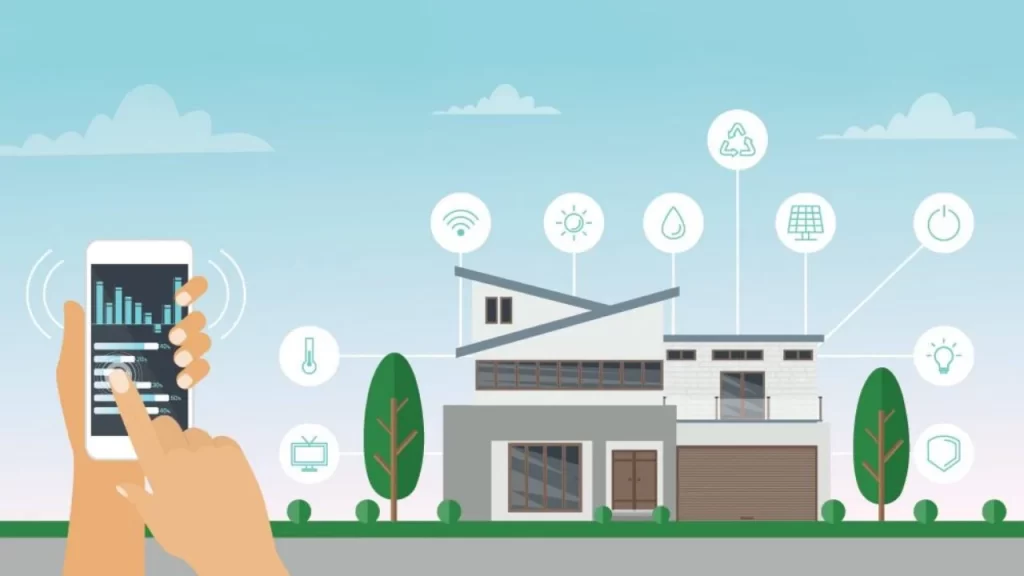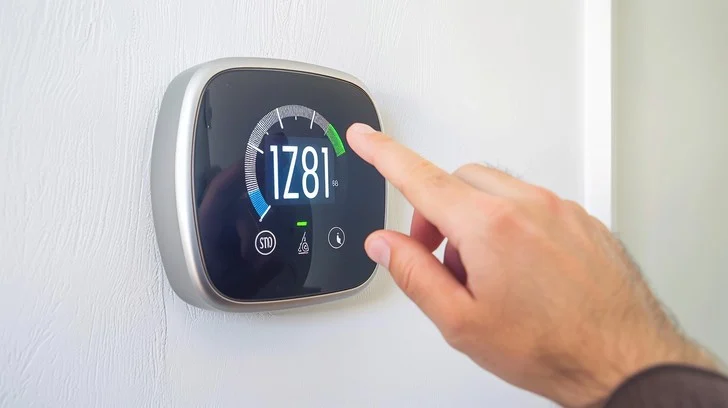To improve energy efficiency in smart home systems, homeowners are increasingly turning to intelligent technologies that reduce power consumption, optimize energy use, and lower utility costs. These systems do more than just automate your lights or heating — they help create a sustainable and cost-effective living environment. In this article, we’ll explore how to make your smart home more energy-efficient, which tools offer the most impact, and practical tips you can start using today.

📡 What Are Smart Home Systems?
Smart home systems are interconnected devices that allow homeowners to control and automate various household functions such as lighting, heating, security, and appliances through the internet. Devices like smart thermostats, lighting systems, plugs, and energy monitors are controlled via mobile apps or voice assistants like Google Assistant or Alexa.
These systems collect data, learn user behavior, and optimize energy usage accordingly. The result? Lower bills, more control, and a smaller carbon footprint.
🌡️ Smart Thermostats for Optimal Climate Control

Smart thermostats are among the most efficient tools for improving energy efficiency in smart home systems. These devices automatically adjust the temperature based on your routines. For instance, they can lower the heating when you leave for work and raise it before you return.
According to recent studies, smart thermostats can reduce heating and cooling bills by 10-15%. That means not only comfort but also noticeable savings on your energy bill.
💡 Energy-Efficient Smart Lighting Systems
Smart LED bulbs and motion-sensor lighting systems are designed to function only when necessary. They turn off automatically when no one is in the room and can be controlled remotely via apps. This prevents energy waste and adds a layer of convenience.
Smart lighting systems also let you set schedules or dim lights to suit different times of the day, saving both energy and money.
🔌 Avoid Standby Energy Waste with Smart Plugs
Many devices continue to consume power even when they’re turned off — this is known as “phantom load.” Smart plugs monitor and manage power flow to devices, completely cutting off power when not in use.
By integrating smart plugs into your smart home systems, you can eliminate unnecessary energy usage from appliances like TVs, chargers, or coffee machines.
📊 Analyze Your Usage with Energy Monitoring Systems
Smart home energy monitoring systems track your real-time energy consumption. They provide insights into which devices are energy-hungry and help you adjust your habits accordingly.
The ability to review detailed energy reports gives homeowners a chance to make informed decisions and prioritize energy efficiency in daily life.
☀️ Integrate Renewable Energy with Solar Panels
One of the most impactful ways to improve energy efficiency in smart homes is to integrate solar power. Smart home systems can work alongside solar panels and storage batteries to use renewable energy more effectively — even at night.
By reducing reliance on the grid, you not only lower your energy bills but also promote eco-friendly living.
🧠 The Role of Automation Scenarios in Energy Efficiency
Creating automation rules is a great way to improve energy efficiency in smart home systems. For example:
“When the temperature hits 25°C, turn on the fan and close the blinds.”
These scenarios can include temperature control, lighting, and even device usage, ensuring that your home operates efficiently with minimal manual intervention.
📱 Control Everything from Your Smartphone
One of the best things about smart home systems is remote access. Whether you’re at work or on vacation, you can monitor and control your energy usage through mobile apps.
Get notified if a device is left on, and turn it off instantly — no matter where you are.
This level of control significantly contributes to energy-saving efforts and adds peace of mind.
⚠️ Things to Watch Out for When Using Smart Home Systems
To get the most out of your smart home energy solutions, keep the following tips in mind:
- Use strong passwords and change them regularly
- Always keep device software up to date
- Choose trusted brands with proven reliability
- Separate smart devices from your main Wi-Fi network
- Regularly review your energy reports and adapt accordingly
✅ Practical Tips to Maximize Energy Efficiency
- Use Scheduling Features: Set your devices to run only during peak times or when needed.
- Voice Control for Instant Management: Use assistants like Alexa or Google Assistant to manage devices quickly.
- Regular Maintenance: Keep firmware updated to ensure performance and security.
- Optimize Based on Reports: Review your monthly consumption to identify where you can improve.
🌍 Why You Should Prefer Smart Home Systems for Energy Efficiency
Smart home systems don’t just offer energy savings; they provide comfort, security, and environmental benefits. They help you cut down on unnecessary consumption and reduce your carbon footprint.
Over time, the investment pays off by significantly lowering your monthly energy costs.
If you want to take control of your home’s energy usage, smart home systems are your go-to solution for a more efficient, sustainable lifestyle.
Want to learn more about how smart home automation works? Check out our guide: How Do Smart Home Systems Work?